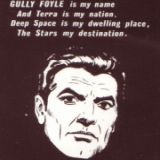|
Anyone got recommendations for a good bit of exploration-based fiction? I just read Lovercraft's At the Mountains of Madness, and I realized I have kind of missed reading that old-school style of exploration fiction. Or something like Rendezvous with Rama (original one obviously). There's just something fascinating for me about people exploring completely alien or strange places.
|
|
|
|

|
| # ¿ May 15, 2024 22:42 |
|
habeasdorkus posted:Darmok is definitely considered one of the best episodes ever, I've never even seen anyone get snippy over the universal translator not working. What nerds. There's so many other places that the universal translator makes little to no sense if you try to think about it (for instance, Picard using a French phrase, then having to explain it in English, or Klingon somehow being immune to translation). It's like the transporters, it's there as a way to make the show work, and shouldn't be examined unless an episode wants to use that piece of tech as a hinge point, and then you should just assume it works that way for that episode. There's no way to really reconcile all the ways writers have changed how it works. So it works until it doesn't, then doesn't work until it does.
|
|
|
|
Kestral posted:56% of the way through Rogue Moon, and I can't remember the last time I felt so bait-and-switched by a book. I just read Rogue Moon on a recommendation from the thread, and I felt very similar coming out of it. It has such a great concept at the heart of the story, but it's also so melodramatic. I don't know if its the right way to say it, but it sort of felt like a stage play? Like all the main characters deliver these long monologues that I cannot imagine someone in real life saying. And all the main characters are pretty unpleasant in their own ways. I'd still recommend finishing it out, it's not very long and there's certainly some good stuff near the end that's more in the exploring implications of the sci-fi stuff over the character drama. As someone in this thread said (spoiler if you haven't finished it I think) the exploration of creating a clone that has no reason not to think it's the so-called real version and the ethics surrounding that have been done a ton in the time since, like in the Prestige, or even with Tom Riker in TNG, but this is an early example of it. I also enjoyed the bits about error handling when trying to clone, and how do you know if something did go wrong when combined with the issues of human memory itself.. Don't expect too much in the way of a resolution though.
|
|
|




